The Hatchery
Public Sector Integrity & Governance: Ethical decision making in the grey
Tuesday 6 May 2025, 9.10 – 9.50 am
Opening Keynote: Stewardship as a value in the public sector
SLIDE 2
Acknowledgement of country
• Good morning, everyone. I am very pleased to be here today to talk about public sector
stewardship and integrity with so many experts in the field.
• While I won’t read out the APSC’s Acknowledgement of Country, I do want to acknowledge
the traditional custodians of this beautiful country we have the privilege to call home.
• I also want to acknowledge the direct linkages between stewardship and the traditional
custodians of Australia.
• There is perhaps no better example of stewardship in action. The concept of stewardship
lies at the heart of indigenous culture. In caring for Country, Indigenous Australians draw on
laws, knowledge and customs that have been inherited from ancestors, to ensure the
continued health of lands and seas.
• There’s much we can learn about Stewardship from the examples set by Indigenous
Australians: in passing on knowledge and wisdom, in understanding that we al play a role in
contributing to the greater good, and constantly taking action with a view to long term
interests.
Introduction
• In addition to that point of reflection, I also want to say that I am especial y honoured to be
giving the opening keynote speech at an event that promises to explore the depth and
breadth of public sector ethics and integrity from such a wide and wel -informed range of
perspectives.
• It is so important to take time to have these conversations—in forums like these, in
workplace training and development, and as a matter of practice in our day-to-day work—to
keep public sector integrity front of mind, and to help us engage in an ongoing way with the
ethical dimensions of what we do.
• And it is also important, in times of global uncertainty and increased scrutiny of public
services, to remind ourselves in these conversations of what public service is for—its unique
and important role in Australia’s democracy, and its particular obligations, in that context, to
serve government and the community with integrity and professionalism.
• This is why I am especially pleased to be talking to you about public sector stewardship—
about how we safeguard the public service through periods of change and uncertainty; how
we work to improve the service over time—both in what we do and in how we do it—and
how we cultivate our understanding of ourselves as custodians of the public service, and
take responsibility for our part in its ongoing integrity and effectiveness.
• I’m going to be talking to you about Stewardship as a Value in the Australian Public Service,
and our experience and understanding of what that entails—but I hope the concepts, and
our learnings so far, will resonate more broadly.
SLIDE 3
Stewardship as a value in the public sector
• While Stewardship is a new Value in the APS—it is not a new concept for the public service.
• Stewardship became an APS Value under the
Public Service Act 1999 on 11 December 2024,
with an accompanying Value statement in the Act which states:
The APS builds capability and institutional knowledge, and supports the public
interest, by understanding the long-term impacts of what it does.
• Even though it is a recent addition to the Act, the new Stewardship Value is an articulation of
concepts that we know have always been at the heart of public service.
• We saw this illustrated right from the start of our process of developing the new Value,
when we undertook public consultation on what stewardship means for the APS, and how
stewardship can be demonstrated by individual public servants.
• We received more than 1500 responses in that initial consultation—primarily from APS
employees, who comprised 97.5% of total respondents.
• The responses indicated that stewardship already resonated strongly with public servants.
Key themes from the responses centred around the need to look ahead and consider the
long-term interests of Australians, and for the APS to maintain its knowledge and capability.
SLIDE 4
• A majority of respondents suggested that stewardship includes:
o taking care;
o thinking long-term and for future generations;
o maintaining knowledge;
o responsible management; and
o providing frank and fearless advice on long-term impacts.
• Based on this consultation process, we distilled core themes into a set of requirements
under the
Australian Public Service Commissioner’s Directions 2022 on the scope and
application of the new Value.
SLIDE 5
• The Directions set out six specific legislative requirements, scalable for all classifications and
roles. It was important to us in developing these operational requirements to:
o bring the Value statement to life and make it visible, practical and feasible;
o differentiate the Stewardship obligations from requirements under the other five
Values—noting that there may still be some conceptual synergies and overlaps; and
o identify clearly some elements of ‘APS Craft’ that perhaps had not been expressed in
the Public Service Act framework in unambiguous terms. Particularly front of mind for
us were those elements that may ‘go without saying’ or are legislatively required
elsewhere—such as considering long-term implications and risks, embedding
evaluative practices, and effective recordkeeping.
• The Directions make clear that the requirements apply to all APS employees, having regard
to their duties and responsibilities. This means that all of us have obligations as stewards of
the APS, but these obligations take on additional dimensions in more senior roles, and are
amplified in proportion to our responsibility and influence.
SLIDE 6
• We are striving for a careful balance here. Stewardship has historically been a legislative
obligation only for Secretaries of departments and for the Australian Public Service
Commissioner—and through the new Value we are broadening that obligation to all public
servants, because we recognise that everyone has a role to play in the stewardship of the
APS.
• At the same time, we know that the scope of that role—and the associated responsibilities—
become greater the more influence we have. The impact of our actions becomes more
immediate and more significant when we cast a larger leadership shadow, and our role in
stewarding the APS becomes much more direct and consequential.
• I feel this personally in my role—both as a member of the Senior Executive Service, and also
as the leader of the Integrity branch in a central integrity agency. I see it amplified in our
Commissioner and Deputy Commissioners, who play a significant role in safeguarding the
integrity of the APS, and who are active and visible stewards of the service. And I see it
amplified further for Secretaries of departments, who are stewards not only of an agency but
of a portfolio, with the breadth of responsibility that entails.
• This means that the greater our sphere of responsibility, the greater our ability to steer the
APS—and the greater our obligation to steer it in the right direction. Stewardship entails
being mindful of the impact we have, and conducting ourselves with integrity to ensure that
that impact serves the public good.
• With al of this in mind, I’d like to talk more about how we have come to define and
articulate stewardship to support public sector integrity and good governance, and how all
public servants can demonstrate and embody stewardship in our actions and decisions every
day.
Defining stewardship and its role in fostering accountability, ethical decision-making and public
trust
• I think a fundamental aspect of stewardship is a commitment to maintaining the long-term
integrity of the public service—both in the sense of its capacity to do the right thing; but also
in the sense of maintaining its institutional core, and working to stay true to its purpose and
its place in Australia’s democratic system.
• Thus, stewardship means doing the right thing, even if that’s not the easiest or most
convenient thing right now. It means considering what is right in the long term, and being
clear-eyed about the real and enduring impact of what we do.
• In this way, stewardship supports
accountability, by requiring us to have regard to the
ongoing impact of our decisions, and being deliberate in considering our decisions from a
long-term perspective.
• Stewardship requires us to take ownership of our decisions not only in the moment, but also
over time; and to consider what wil happen
after we implement an idea or solution, instead
of al owing ourselves to be captured by the temptation of quick wins.
SLIDE 7
• For individual APS employees, this can look like:
o conducting thorough analysis, including looking at actions taken in the past and the
effects they had;
o taking time to consider proposed actions from the perspective of those who may be
impacted by them;
o considering unintended consequences, such as measures that could inadvertently
exacerbate inequality; and
o taking time to reflect and learn.
• These personal obligations are amplified for senior leaders, as their perspective is necessarily
broader, and their impact and influence wider-reaching.
• Senior leaders also have additional stewardship obligations to support the accountability of
their teams, their agencies, and their portfolios. Fundamental y, these go to ensuring that
systems and culture support long-term thinking, learning and evaluation, and strong
recordkeeping practices.
• I include recordkeeping here as it is a core stewardship obligation under the Commissioner’s
Directions, and a key pillar of our accountability as public servants.
• As stewards of the APS, we are all required to make and keep records that provide a
complete and accurate account of key actions and decisions. Our records should ensure that
whoever needs to access the information will understand not only what was done, but also
the reasons and context for the action or decision. Good records also enable the public
service to learn from the past and improve over time.
• Just as stewardship fosters accountability for our actions and decisions, a stewardship
mindset also helps ensure that the decisions we make are lawful, evidence-based, wel -
reasoned, and consistent with the public good. In this way, stewardship also supports and
underpins
ethical decision-making.
• Broadly speaking, we understand ethical decision-making to be the process of recognising
and working through relevant considerations to make the best decision in the circumstances
about the right thing to do.
• It requires us to recognise that there may not be a single answer to the question of what is
right in a specific matter, and that in such cases we will need to choose the option that aligns
most closely with the principles that underpin our values, our purpose, and our role.
• Stewardship supports ethical decision-making by requiring us to be deliberate in considering
a range of factors, perspectives, evidence, and potential consequences; and in reflecting
actively on the outcomes of our decisions.
• Stewardship requires us to look forward, and be deliberate in thinking out the impact of our
choices, including unintended consequences.
• It requires us to look back, and be deliberate in finding and considering all relevant
information—whether or not it is immediately welcome—and being clear-eyed in learning
from past actions and decisions to inform our choices in the present day.
• And it also requires us to look around us at the landscape we are operating within—the role
and purpose of our agency and our portfolio in the work of government, and the role and
purpose of the public service in our system of democracy—and make choices that align with
these.
• These processes of deliberately looking forward, looking back, and looking around also serve
to slow down our thinking. Slowing down can help us avoid cognitive biases; can enable us
to consider multiple options, not just those that come to mind immediately; and can give us
space to work through long-term implications.
SLIDE 8
• Senior leaders have significant further obligations in this regard, not only to ensure that staff
have the knowledge and resources they need to recognise ethical issues and make sound
decisions, but also to create a culture in which staff feel safe and supported to do so.
• Stewardship requires senior leaders to:
o ensure their teams have the time, resources, and capability to assess and articulate
the implications of their actions;
o provide an authorising environment for their teams to step into the shoes of those
who may be impacted by their decisions, before committing to action;
o be open to advice that may be unwelcome or inconvenient in the short term;
o foster a culture of critical thinking; and
o foster psychologically safe workplaces where staff feel safe to raise issues or
concerns, and to acknowledge and learn from mistakes or failures without fear of
ridicule or reprisal.
• Stewardship supports ethical decision-making by requiring us to act in a way that ensures
our decisions support the public interest, having regard to our role and purpose as an
institution—and ensuring that the course of action we choose is the one most likely to
maintain trust in the integrity of the Service.
SLIDE 9
• In this way and others, stewardship also supports
public trust.
• We understand public trust to be the confidence the community has in government—trust
that the government wil act in the interests of Australians, will use public resources for the
public good, and will deliver on its commitments.
• Public trust also means that the community has confidence that the public service wil
conduct itself with integrity—that the service will be apolitical and professional.
• A stewardship mindset can support the public service to earn public trust by enabling it to
stay true to its purpose, to act with an eye to the future while learning from the past, and to
be mindful of the impact it has on the community it serves.
• An APS that embodies stewardship is one the public can trust will advise on and implement
the priorities of government with integrity, over a longer time horizon than three-year
political cycles.
• Every public servant has a role and responsibility to steward the APS by exercising judgment,
every day, when doing things that can enhance or undermine trust in the integrity of the
institution for which we are responsible. This is an active and ongoing process.
• However, it is not only trust in our integrity that matters—though that is fundamental. Also
important is public trust in the institutional knowledge and expertise of the APS.
• Essentially, it is vital that the community, the government, and the Parliament can trust that
the public service knows what it is doing.
• A core component of Stewardship under the Commissioner’s Directions is:
Supporting and contributing to a workplace culture that sustains core knowledge,
expertise, and standards of professionalism to deliver intended results with integrity.
• The experience that each public servant acquires in serving the government and the
community over time, and our deep expertise as a service in the range of matters on which
we advise and deliver for government, is a national resource in its own right—and is key to
maintaining public trust in the advice we give and the services we deliver.
• This means that as stewards of the public service we must be active and deliberate in
cultivating and drawing on our institutional expertise and knowledge to serve government
and the community.
• In practice, this can amount to:
o appropriately sharing knowledge and resources with colleagues;
o proactively considering ways to improve work processes or systems;
o working collaboratively to achieve outcomes;
o being open to new ideas;
o engaging in ongoing learning and development, both formal and informal; and
o handing over key tasks and know-how to team members when departing a role or
simply taking leave.
• For senior leaders there are additional obligations, including:
o taking the time to explain or share processes or rationale to ensure work is supported
by full information;
o fostering and investing in subject matter expertise;
o engaging in robust succession planning;
o fostering a culture in which diverse perspectives, lived experiences, and skill sets are
recognised as critical to achieving agency goals;
o supporting, mentoring and coaching the next generation of APS staff;
o promoting and demonstrating collaboration across the APS;
o promoting employee understanding of what it means to be a public servant; and
o personally role-modelling APS professionalism in a way that is genuine and visible to
staff.
• The work we do to safeguard our institutional knowledge and expertise—to safeguard the
craft of public service—matters deeply, not just because we want to be good at what we do,
but because it is a cornerstone of trust in the APS, and in turn, democracy in Australia.
Sustainable governance through policies and systems that drive equity, resilience and long-term
value
• I’d like now to talk about another aspect of stewardship—one that is itself a core aspect of
public service craft—which is stewardship through our governance practices.
• Fundamentally, sustainable governance is stewardship in action.
• Governance is in effect the strategic stewardship of resources to enable the achievement of
outcomes.
• It requires:
o long-term thinking; strategic planning; and active engagement with risk;
o setting strategic objectives that are aligned with an entity’s context and purpose;
o careful stewardship of resources, including institutional expertise and knowledge;
o robust and regular evaluation—to ensure an entity remains effective and fit for
purpose, and to support effective delivery of outcomes; and
o strong information management—to enable an entity to maintain its institutional
knowledge through periods of change; meet its accountability obligations for actions
and decisions; and ensure its work is informed by accurate data and relevant
background.
• The practices of governance and stewardship go hand in hand, and I’d like to take a moment
to talk about this from my own perspective in a central agency.
• A key aspect of stewardship, which I advocate for strongly in my work, is the stewardship of
resources within the APS, and how they can be managed more strategically for the collective
good.
• I spoke earlier about the wealth of knowledge and capability we have across the service. A
further dimension to this is the importance of sharing our knowledge and expertise—and our
resources more broadly—across the APS.
• While it is necessary and appropriate to cultivate agency-specific understanding and
capability, there are significant areas of commonality across the APS where sharing and
cooperation can benefit the service as a whole.
• This can range from agency heads making staff available to meet surge needs, to agency
corporate areas collaborating on or sharing strategies, policies, and guidance on matters
common to the APS, to agencies sharing IT infrastructure, systems, and administration.
• In pooling and sharing our resources, we promote
equity among agencies such that smaller
or more specialised agencies are not disadvantaged compared to larger, well-resourced
agencies or departments.
• What I see in my role are opportunities to share and learn from one another, so that
disparities in resourcing and capacity do not create disadvantage for any agencies or their
employees.
• This requires us to take a whole-of-system perspective as stewards of the APS—to identify
gaps and areas of need, as well as areas where we can maximise economies of scale, in order
to remedy inequities in the system from within the system itself.
• Cross-agency collaboration and sharing also supports the
resilience of our service by
minimising points of vulnerability and ensuring that every agency can be equipped to meet
its responsibilities over time.
• Good governance—and, likewise, stewardship—involves effective and honest engagement
with risk. To achieve effective outcomes, and to be effective as an institution, we need to be
active in identifying and assessing potential areas of disruption or failure.
• We also need to be deliberate in our consideration of strategies to mitigate or manage the
risks that are identified, and revisit these periodically, to ensure the resilience of our project,
our program, or our institution.
• In my role I see the risks of agencies operating in isolation—the resource cost of needless
duplication; the inability of smal , stretched corporate teams to provide a comprehensive
suite of policies and guidance for their staff; the possibility of inadvertent non-compliance
with legislative obligations; the potential for some agencies and employees to feel distant
from the APS; and so on. And if these risks are unmanaged, there is then a further and
greater risk that public confidence in the APS wil be eroded.
• In stewarding whole-of-APS resources effectively, we can mitigate these risks and build
resilience into the system by protecting against single points of failure.
• Further, the stewardship of our resources supports
long-term value—for example, by
ensuring we don’t use our limited resources to duplicate work needlessly. Pooling and
sharing resources enables us to create something once, to be used widely and over the
longer term. This is of value to us as a service, but is also of value to the community and the
government, on whose behalf we steward public funds.
• I spoke earlier about long-term thinking as a key requirement of stewardship—and this also
applies to strategic consideration of the long-term value of what we choose to invest in.
• This can be as simple as investing time and effort in creating templates that can be shared
within and between agencies, to minimise duplication of work; or a centralised repository of
APS guidance and resources—such as the Chief Operating Officers Resource Hub on
APSLearn, for APS administrative and workforce matters.
• It also means investing in people; that is, safeguarding our institutional knowledge and
expertise for the long-term benefit of the service—both within agencies and through cross-
agency forums and communities of practice.
• And it can sometimes be more complex, more sensitive, and more personal—in times when
we invest our courage and our capital in providing advice that may not be well-received in
the short term, for the longer-term good of our agency or the APS.
• The stewardship of APS knowledge and resources is, of course, a very inward-looking
example—though one very close to my heart given my own stewardship functions as a
representative of the Australian Public Service Commission.
• But the principles apply to al the work we do, both inward and outward facing—and a
stewardship-informed approach to governance embeds structures that support sustainable
long-term value; recognise and overcome obstacles to delivery; and avoid or correct
unintended consequences to minimise inequity and disadvantage.
Empowering public servants with tools and training to embody stewardship, ensuring integrity
under pressure
• I’ve talked at length about what it means to embody stewardship in the public service—and
I’d now like to consider the tools and support that public servants need in order to be good
stewards of the APS.
• Like all ethical behaviour, stewardship is a practice. It is something we can learn, something
we can work at, and something we can improve on over time.
• As I mentioned earlier, in developing the Stewardship Value it became clear that public
servants already had an underlying understanding of what stewardship looks like, and were
in many ways already demonstrating stewardship in practice.
• The task for public servants now is to be deliberate in their stewardship behaviours—to be
active in identifying and embodying them, to reflect on how we do so, and to practise these
behaviours consistently.
• When we see stewardship as something we can cultivate in ourselves—rather than as a fixed
characteristic we either have or don’t have—we can exercise agency in practising and
embodying it.
• And when we make a practice of seeing our actions and decisions through a stewardship
lens, and embodying stewardship as a matter of routine, we’re much more likely to keep
doing the right thing under pressure, when it might otherwise be more challenging to act
with integrity.
• However, public servants cannot do this in isolation, and must be supported and empowered
to engage in the practice of stewardship.
• In a moment, I will talk to you about the practical tools, resources, and strategies that are
available to help employees understand their stewardship obligations and hone their
stewardship capabilities.
• First, though, I want to emphasise that while these tools are important, they are not
sufficient on their own to embed stewardship across the APS, or cultivate stewardship
behaviours in public servants.
• What is also required is a culture of psychological safety.
• Psychological safety is defined as:
The belief that one wil not be punished or humiliated for speaking up with ideas,
questions, concerns, or mistakes, and the team is safe for interpersonal risk taking.
• Psychological safety is also known as ‘speak up culture’, because it enables and supports
honest communication and trust.
• Psychological y safe workplace cultures are ones in which staff feel safe and empowered to
raise issues and concerns, identify risks, and learn from mistakes. This in turn promotes
ethical decision-making, supports public sector integrity, and contributes to broader trust in
government.
• A number of the stewardship behaviours I’ve talked to you about today can only be
demonstrated fully by employees when they feel psychologically safe in their workplace.
• These can include articulating long-term considerations that may not be immediately
welcome; acknowledging failures or mistakes in order to draw lessons for the future; being
open about gaps in knowledge in order to facilitate learning; and raising concerns about the
integrity of processes or behaviours to ensure the right thing is done.
• This means that embedding psychological y safe cultures is a key stewardship obligation for
agency heads and senior leaders—both through their personal behaviour and in the
behaviours they choose to recognise and reward. While all employees have an obligation to
contribute to a psychological y safe culture, this is an area in which senior leaders have
particular influence, and significantly greater responsibility.
• An APS-wide approach to building psychological safety is currently being developed, to set
the standard for what is expected from al leaders and employees.
• This work is well in train, and will be shared and communicated across the APS in the near
future.
SLIDE 10
• In the meantime, there is also a spectrum of tools and resources to help public servants to
hone their stewardship capability, ranging from APS-wide to role-specific.
• The guidance explores in detail each of the Stewardship requirements under the
Commissioner’s Directions, and sets out behaviours that demonstrate each requirement for
APS employees, SES leaders and managers, and agency heads.
• The guidance also includes a suite of case studies that demonstrate the practical application
of each obligation in a range of environments and roles.
• The Commission also provides APS-wide integrity training, ranging from an induction
e-learning module to the three-part SES Master Craft Series.
• Agencies are encouraged to build on these central resources—and share their tools and
products appropriately across the service, consistent with their own stewardship obligations.
SLIDE 11
• Agencies can build their employees’ stewardship capability by:
o providing training, guidance, and case studies relevant to local needs;
o providing learning opportunities, such as integrity hypotheticals, that encourage staff
to engage actively with the practical application of stewardship in different scenarios;
o discussing the application of stewardship in team and branch meetings;
o encouraging employees and their managers to work together to articulate
performance expectations that embody stewardship, so that each employee
understands what stewardship means in their specific role and feels empowered to
practise being a steward of the APS; and
o providing avenues for staff to raise questions and talk through concerns and
dilemmas.
SLIDE 12
• Among other things, we are seeing agencies start to work through the process of embedding
stewardship throughout the employee life cycle—from recruitment, where the opportunity
to steward the APS can become part of the employee value proposition; right through to
separation, where stewardship obligations such as recordkeeping and transfer of knowledge
can become part of the standard offboarding process.
• We are also starting to see agencies explicitly call out stewardship in action as part of their
reward and recognition schemes, both at the individual and team levels—ranging from
spotlight pieces in staff newsletters through to secretary and agency head achievement
awards.
• In addition to local avenues of this kind, the Commission also provides the Ethics Advisory
Service. This is a phone and email service that is available to all APS employees, including
senior leaders, who wish to discuss and seek advice on the application of the APS Values and
Code of Conduct and on ethical issues that arise in the workplace.
• We do this by providing options, considerations, and strategies to help APS employees work
through ethical issues and dilemmas, and to assist them to make sound judgements and
choices.
• Embedding and embodying stewardship is a col ective effort, and we wil continue to support
and champion the sharing of good practice service-wide.
Closing remarks
• This is, broadly speaking, the message that I would like to leave you with, as we move into
the next stages of our conversation here about ethical decision-making in the public sector—the
importance of collaboration, sharing, and learning from each other.
• We know that ethical behaviour is not cultivated in a vacuum—it is something we are taught,
something we learn through observation and osmosis; and something we teach each other, through
our behaviours and our expectations.
• And we also know ethical decision-making is most effective and resilient when it is done in
consultation and conversation with others—because this opens up perspectives and possibilities we
may never have considered on our own; and provides both support and accountability in choosing
the best course of action.
• Likewise, while each of us in the APS is a steward of the public service, none of us can steward the
service on our own. Our stewardship responsibilities are personal and real, and we are each
accountable for discharging them—but the integrity of the service rests on collective as well as
individual commitment.
• I said at the beginning that it’s important to keep having conversations like this one to support and
grow public sector integrity—but the value of these conversations is also in the way that they build
community in the integrity space; enable us to share insights and test ideas; and reinforce the
message that we are not alone in the work we do, or the decisions we grapple with, and that support
is available when we need it.
• Stewardship reflects a communal commitment to leave behind a service that is stronger, more
effective, more trustworthy, and more just—and it is communal effort that will help us get there.
• In that spirit, I would like to thank you all once again for being part of this conversation—and I look
forward to learning from each of you over the coming days.
SLIDE 13
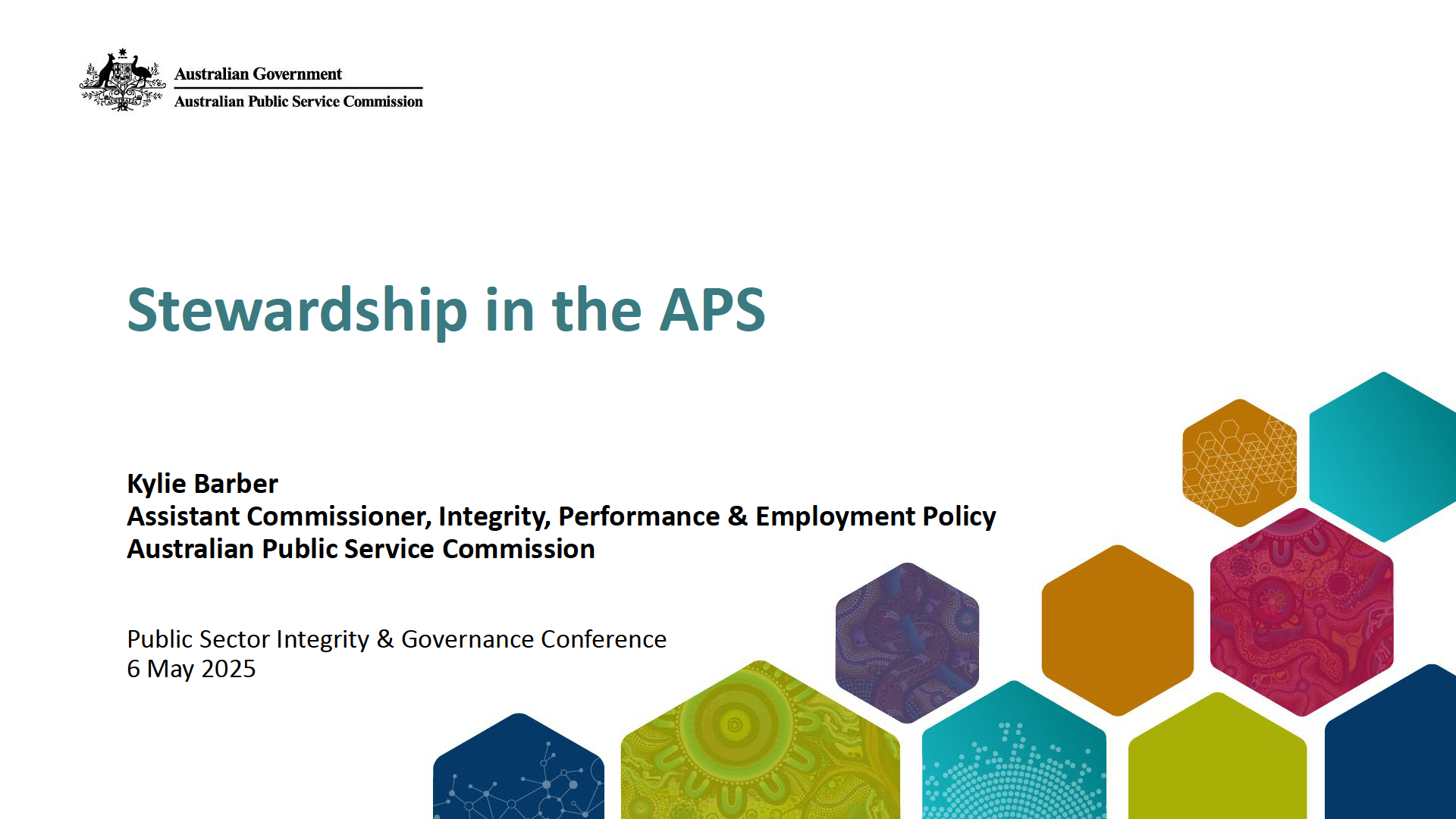
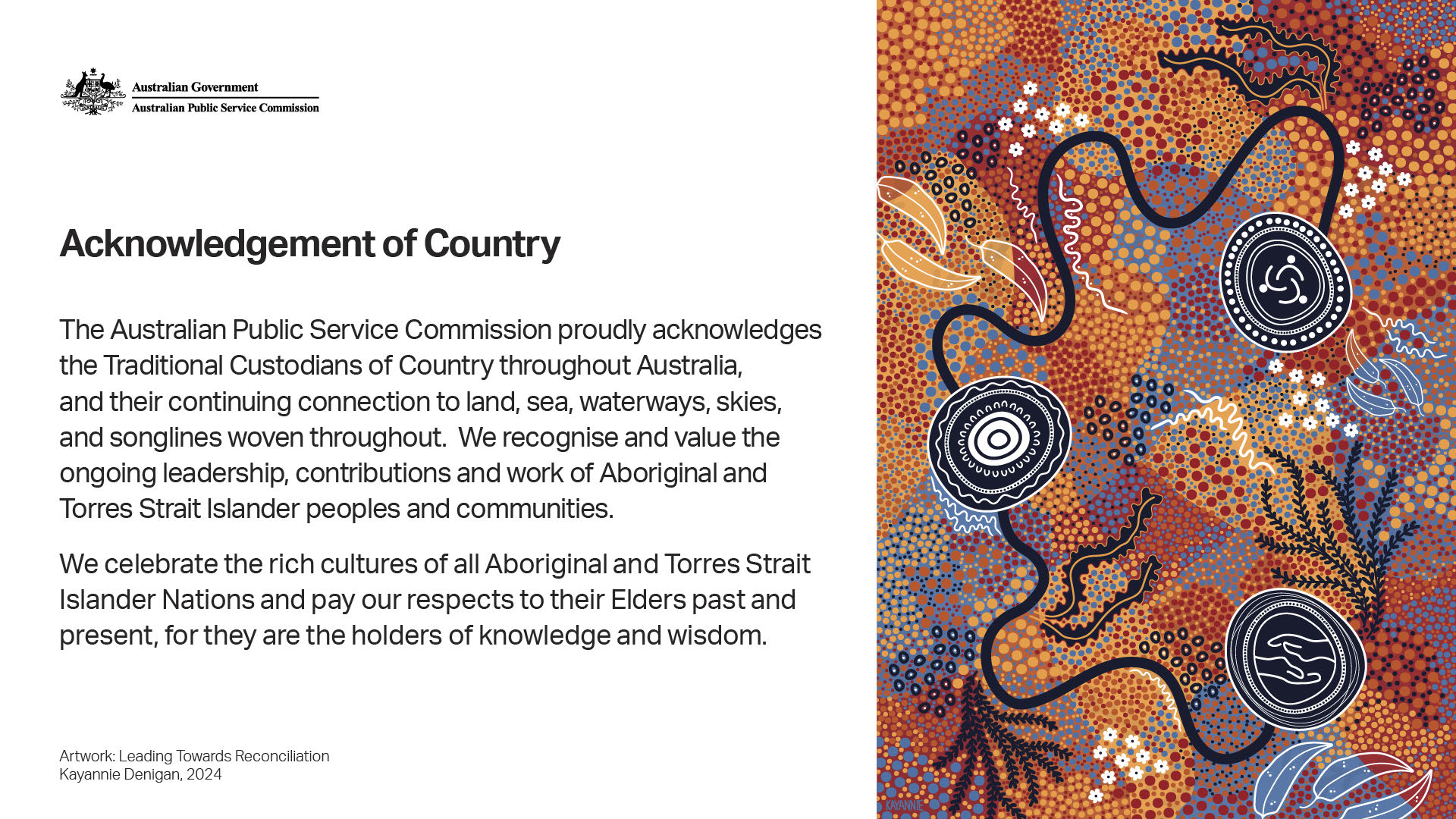
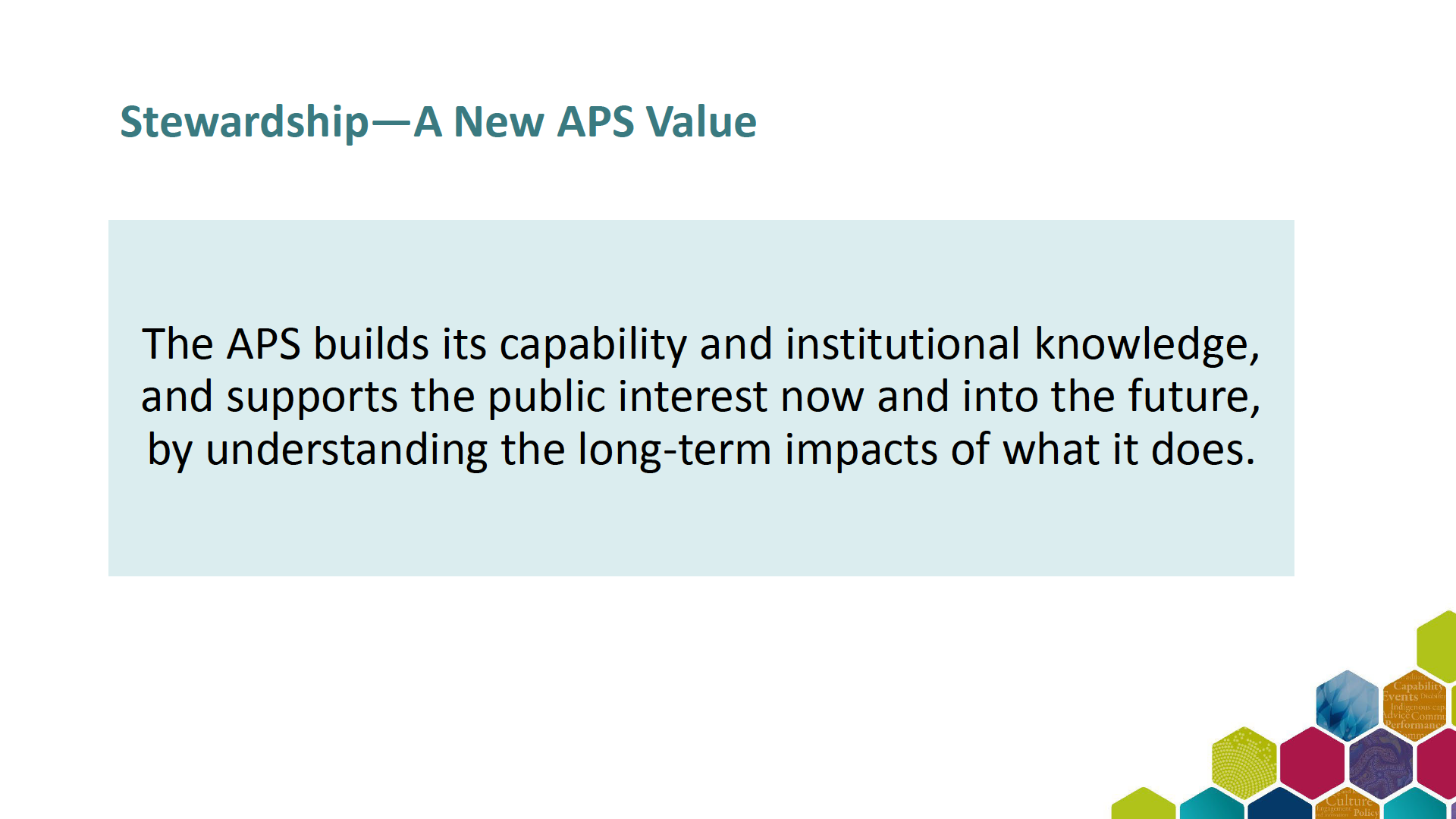
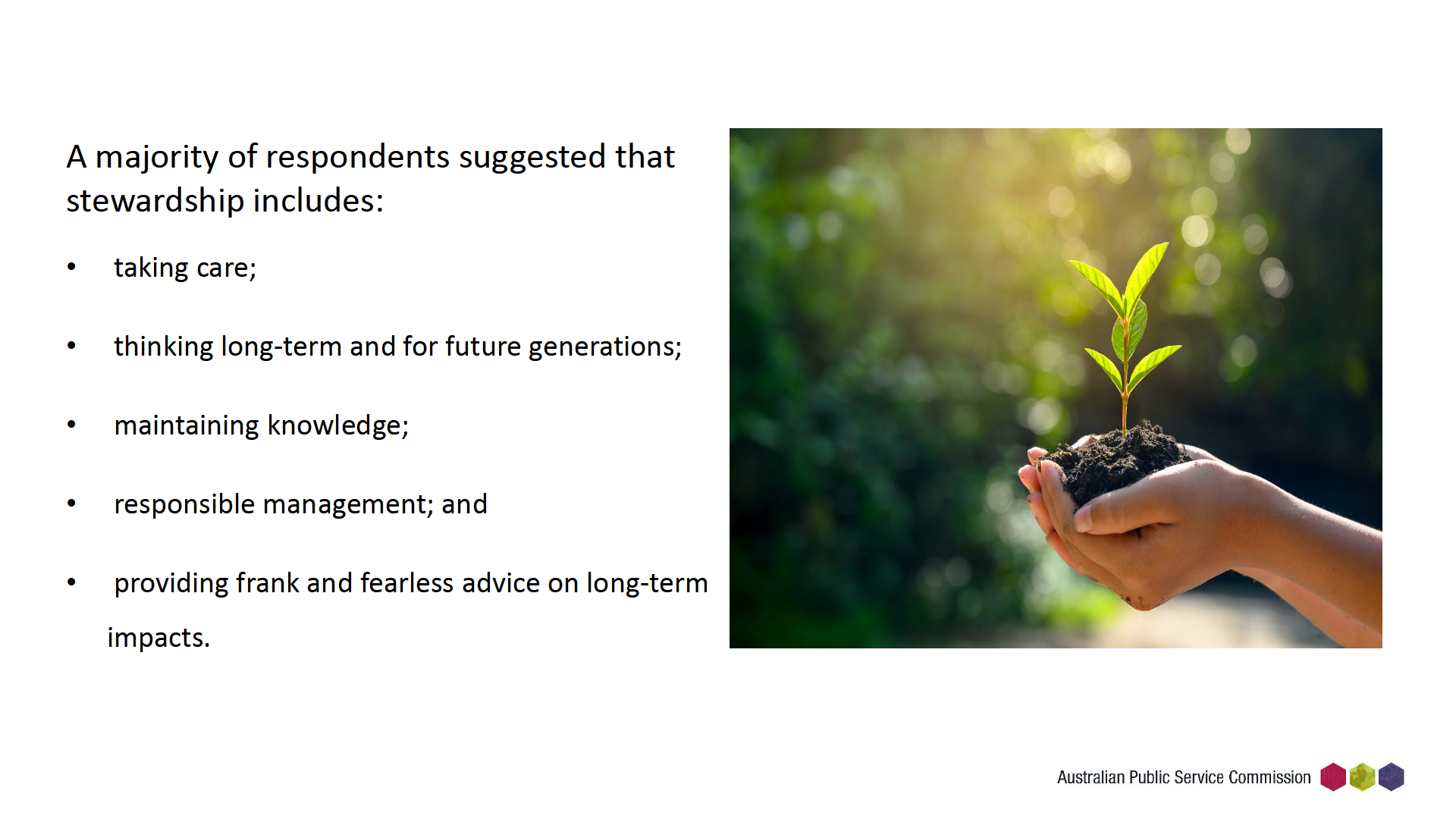
 New section 17A – APS Commissioner’s Directions 2022
New section 17A – APS Commissioner’s Directions 2022
a) having proper regard to known and reasonably foreseeable implications of advice, decisions, and other actions
b) having proper regard to Agency goals and responsibilities and the way in which the individual’s work contributes
to the achievement of those goals and responsibilities
c) supporting and contributing to a workplace culture that sustains core knowledge, expertise, and standards of
professionalism to deliver intended results with integrity
d) reflecting on and learning from past experience and institutional knowledge, including through robust evaluation,
to inform operations, advice, and decisions
e) ensuring complete, accurate, and appropriately accessible recordkeeping of key actions and decisions and
f) representing the Agency and the APS in a way that maintains trust and confidence in the integrity and
professionalism of the APS.
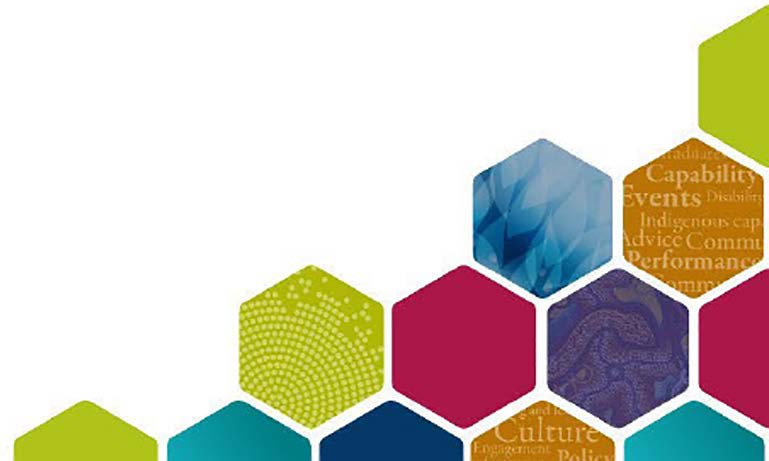 A New APS Value
A New APS Value
• Previously 'Stewardship' applied only to the APS Commissioner,
Secretaries and Secretaries Board
• Stewardship is not new - it's at the core of what we do
• But it's also contextual
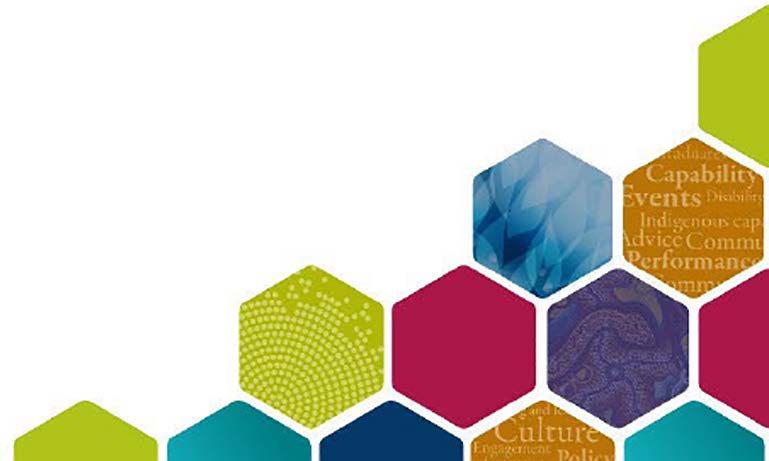 APS Employees
APS Employees
• conducting thorough analysis, including looking at actions taken in the
past and the effects they had;
• taking time to consider proposed actions from the perspective of
those who may be impacted by them;
• considering unintended consequences, such as measures that could
inadvertently exacerbate inequality; and
• taking time to reflect and learn.
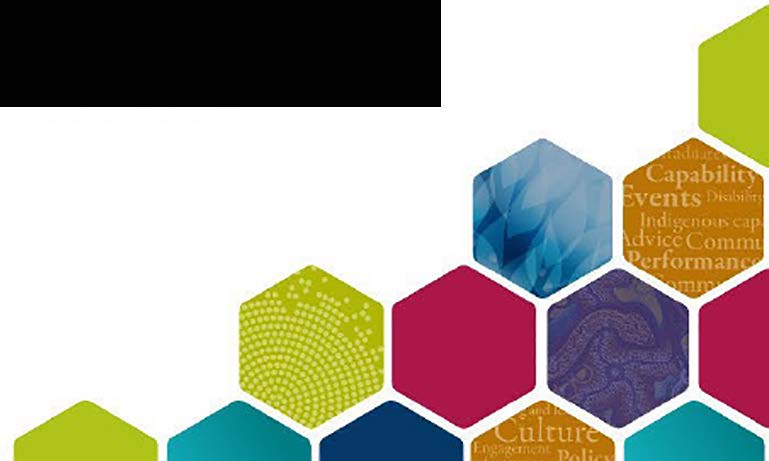 Senior Leaders
Senior Leaders
• ensure their teams have the time, resources, and capability to assess and articulate the
implications of their actions, and to support teams and individuals to do this effectively;
• provide an authorising environment for their teams to step into the shoes of those who
may be impacted by their decisions, before committing to action;
• be open to advice that may be unwelcome or inconvenient in the short term;
• foster a culture of critical thinking; and
• foster psychologically safe workplaces where staff feel safe to raise issues or concerns,
and to acknowledge and learn from mistakes or failures without fear of ridicule or
reprisa I.
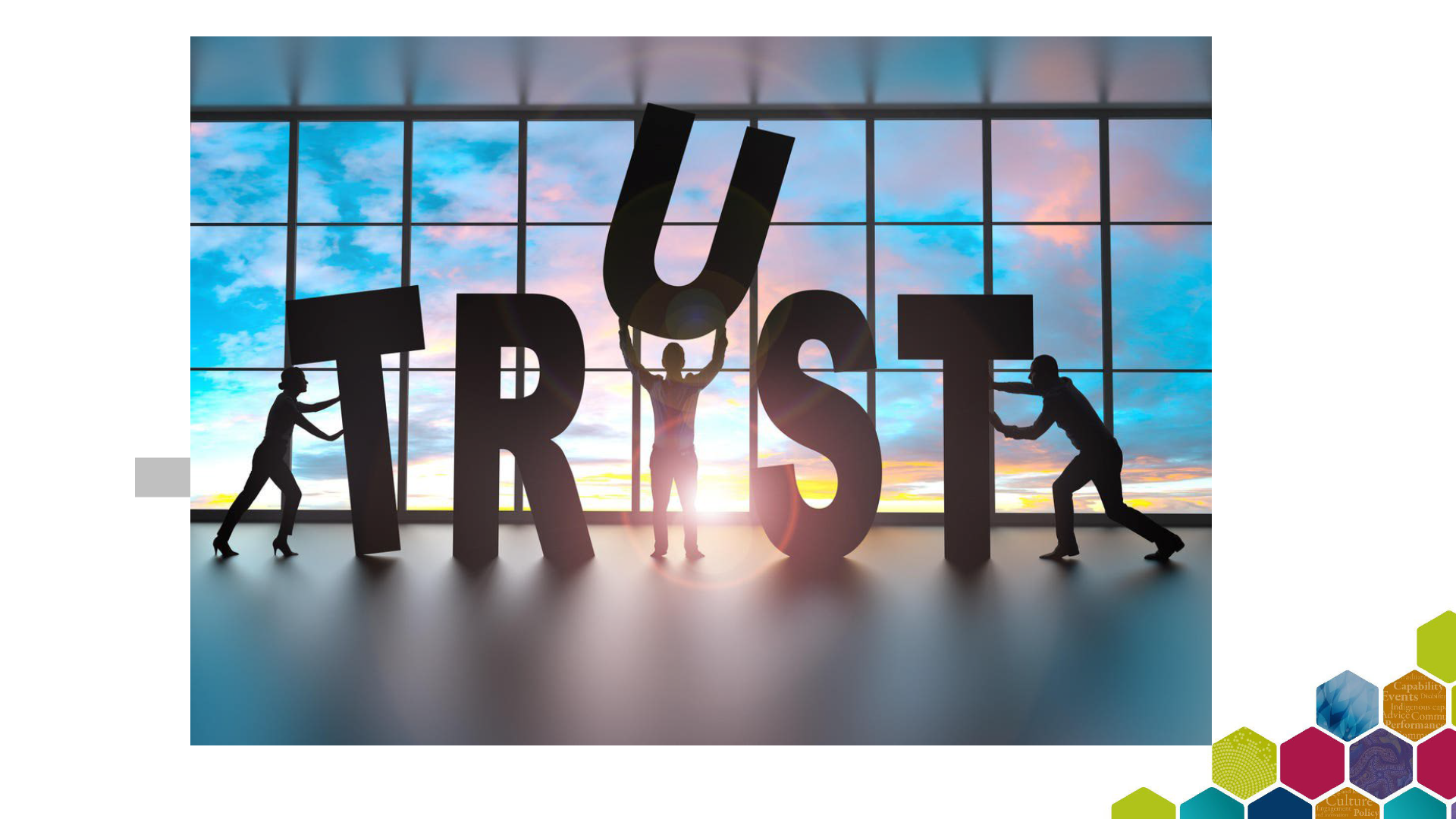
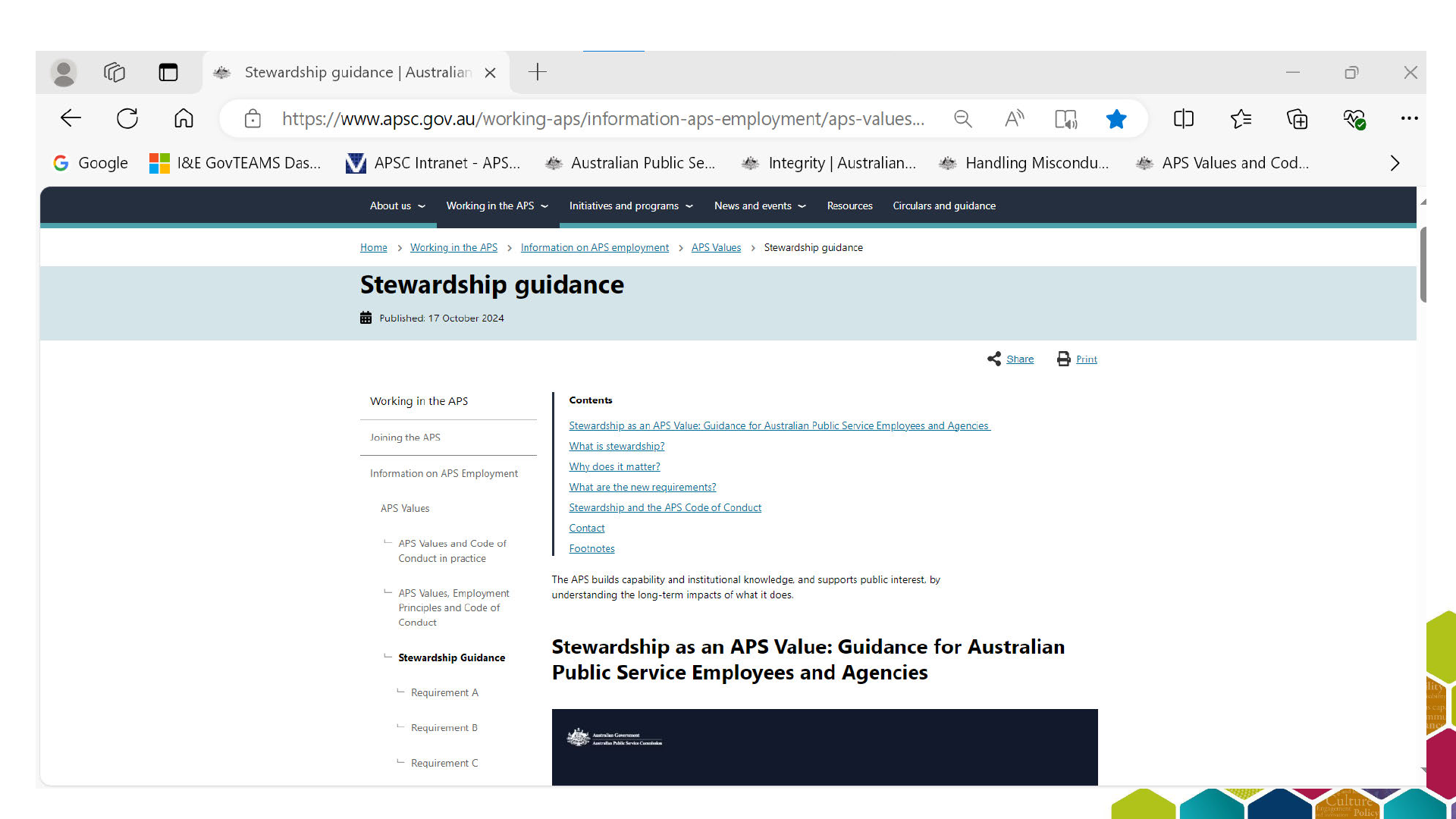
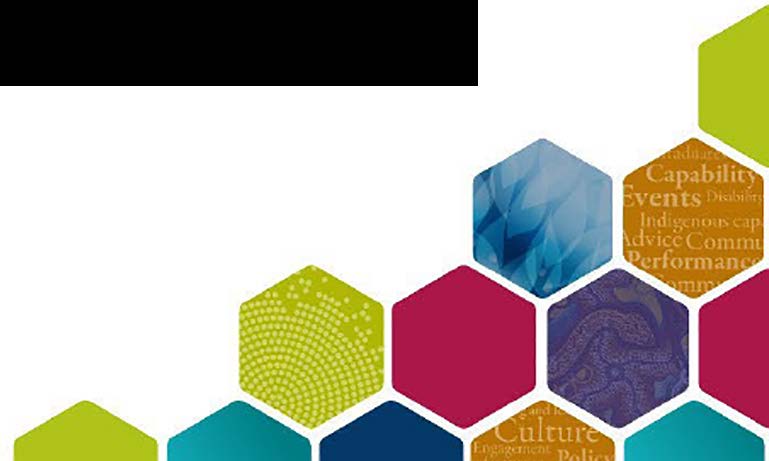 Opportunities to promote and model Stewardship
Opportunities to promote and model Stewardship
✓showcasing agency-relevant examples and case studies via internal staff communication
channels
✓ Agency-wide learning opportunities, e.g. integrity hypotheticals, that encourage staff to
engage actively with the practical application of stewardship in different scenarios
✓Discussing the application of stewardship in team and branch meetings
✓Encouraging employees and their managers to work together to articulate performance
expectations that embody stewardship
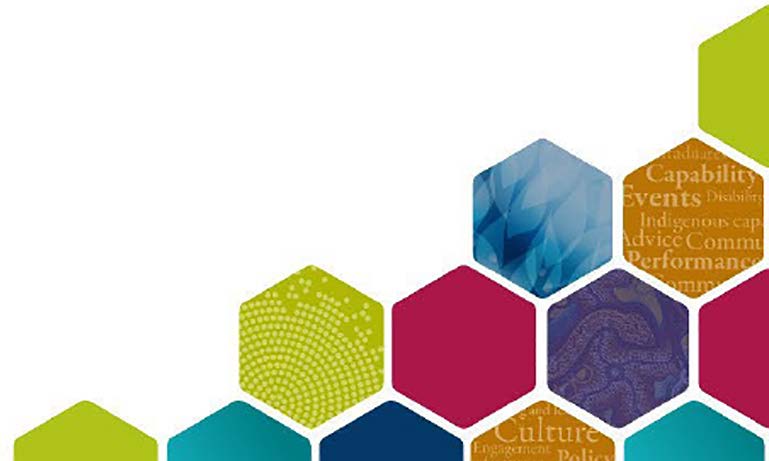 Opportunities to promote and model Stewardship
Opportunities to promote and model Stewardship
✓Providing avenues for staff to raise questions and talk through concerns and dilemmas
✓conveying how stewardship can be demonstrated across your agency's employment
lifecycle -from your EVP through to off-boarding processes
✓Reward and Recognition Program
✓Promoting the APS Ethics Advisory Service
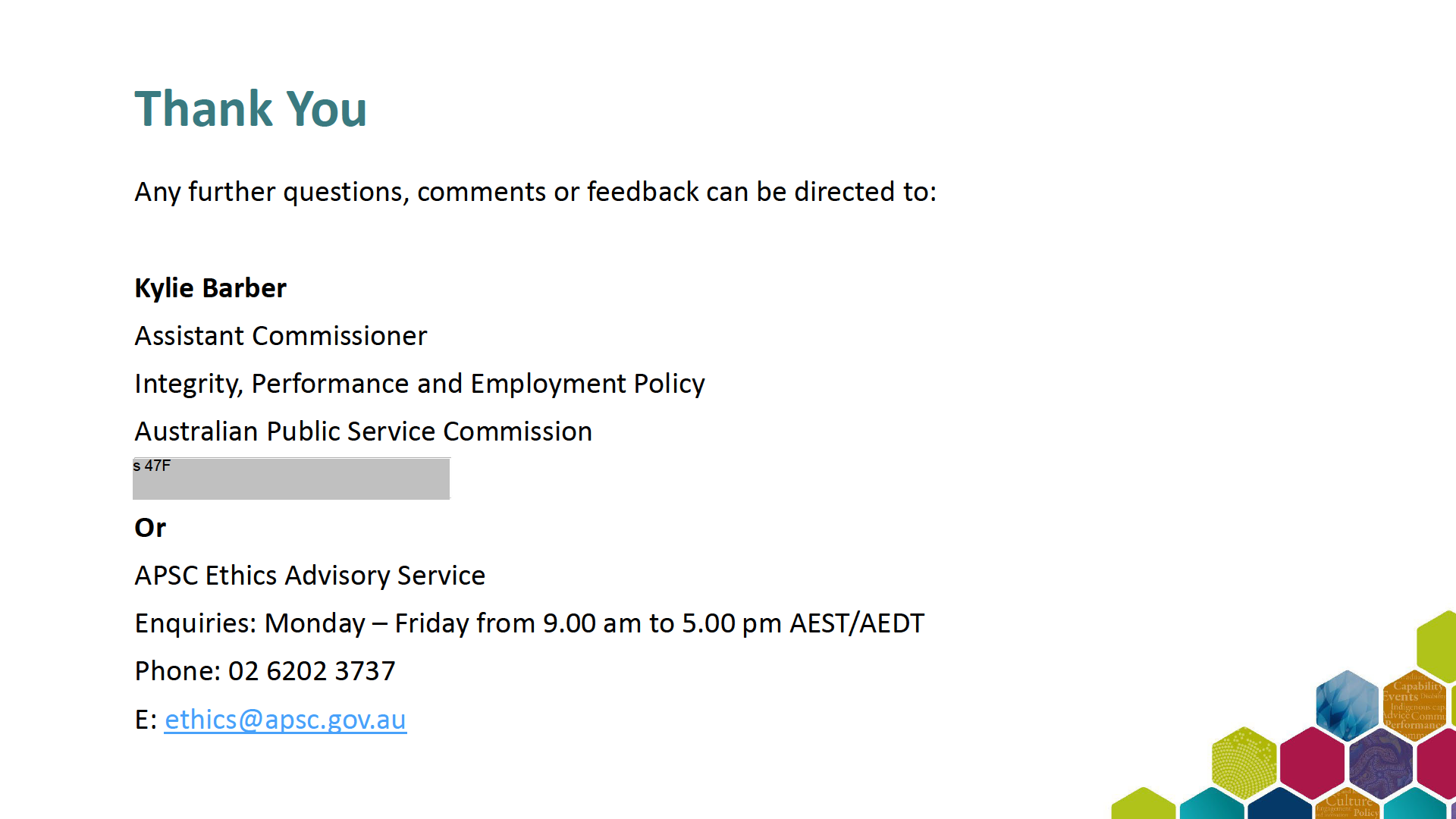

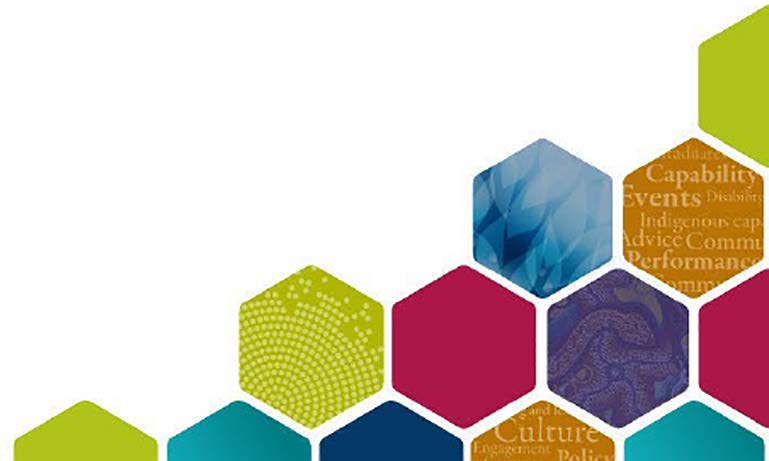 Questions and Discussion
Questions and Discussion














